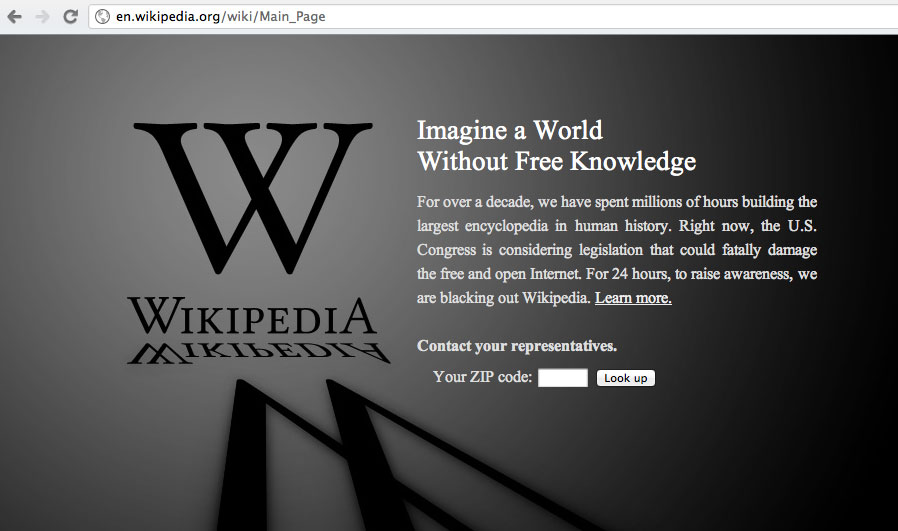On Friday afternoon,
the White House Office of Science and Technology Policy (OSTP) issued a memorandum containing some pretty big news (PDF): all federal agencies with annual research or development expenditures over $100 million must develop policies that will ensure public access to the results of the research activity that they fund.
The White House has twice previously invited comments on the topic of open access to federally funded research, and in May 2012 an online
“We the People” petition gathered in only two weeks the 25,000 signatures required to get a response from the Obama administration (the petition currently has over 65,000 signatures). John Holdren, President Obama’s science advisor and director of the OSTP, issued that response on Friday, linking to the memorandum prepared by his office and saying, “The Obama Administration agrees that citizens deserve easy access to the results of research their tax dollars have paid for… [and] is committed to ensuring that the results of federally-funded scientific research are made available to and useful for the public, industry, and the scientific community.”
You may have heard about the recently proposed
Fair Access to Science and Technology Research Act, aka “FASTR.” It’s the successor to the Federal Research Public Access Act (FRPAA) legislation that was first proposed in 2006 but has never been voted on by Congress. FASTR, if it passes Congress, would legislate open access to federally funded research, but given the length of time FRPAA languished, that’s certainly not guaranteed to happen quickly. However, the OSTP memorandum directs these federal agencies to start preparing their access policies immediately, with a deadline of six months for implementation.
What does this mean for researchers?
If you receive research funding from one of the federal agencies covered by this directive*, your published articles and, in some cases, research data will need to be submitted to an open access repository within 12 months of publication. While it’s too early yet to know the specifics of how each agency will choose to comply with the directive and at what moment their policies will go into effect, it’s not a stretch to assume that the new policies will probably look a lot like the NIH’s Public Access Policy, implemented in 2008, which requires funding recipients to deposit their articles in PubMedCentral. (In many cases publishers assist with the deposit process. You can read more about the NIH policy
on our website.) As a result, your research results will reach a vastly wider audience, including all American taxpayers.
*An incomplete list of these agencies from John Wilbanks includes: the Environmental Protection Agency; NASA; the National Science Foundation; the Smithsonian Institution; and the Departments of Agriculture, Commerce, Defense, Education, Energy, Health and Human Services, Homeland Security, the Interior, State, and Transportation. It isn’t yet clear whether the National Endowment for the Humanities is included. I’ll update this post when more information is available.
Further reading:
 The following is a guest post from Ashley Brewer ’18, a double major in History and English.
Last semester [Fall, 2013], as the final paper for my history course on Dissent in Modern America, I drew up a research proposal on the historic impact of bisexuals on the Gay Rights Movement. I structured this paper around the Bisexual Resource Center collection in Snell Library’s Archives and Special Collections department, partly because of how exhaustive and thorough it was as a source, but also because finding research on the history of the bisexual community was almost impossible. I was surprised to discover that the concept of bisexual erasure extended to the academic community as well; many of the few existing sources were merely self-help guides or scientific studies, with barely a footnote on the subject of the community’s history. Without Northeastern’s Archives, I would not have been able to write my paper at all.
The archive collection itself was received from the Bisexual Resource Center in 2005 and 2007, and consists of 11.5 cubic feet of conference minutes, pamphlets, newspaper clippings, articles, publications, survey results, and, my personal favorite, an extensive scrapbook of the 1993 March on Washington. The documents are not restricted to BRC records but rather cover a wide range of organizations and publications, and one pamphlet in particular details the history of the bisexual community more clearly and concisely than any of the other sources I was able to find. The Archives staff was enthusiastic and extremely helpful, and for future projects I will definitely check there first before venturing over to the Boston Public Library. I cannot begin to express how incredibly essential Snell Library’s Archives and Special Collections department was to my research, and I highly encourage others to take a look and see what they have to offer.
The following is a guest post from Ashley Brewer ’18, a double major in History and English.
Last semester [Fall, 2013], as the final paper for my history course on Dissent in Modern America, I drew up a research proposal on the historic impact of bisexuals on the Gay Rights Movement. I structured this paper around the Bisexual Resource Center collection in Snell Library’s Archives and Special Collections department, partly because of how exhaustive and thorough it was as a source, but also because finding research on the history of the bisexual community was almost impossible. I was surprised to discover that the concept of bisexual erasure extended to the academic community as well; many of the few existing sources were merely self-help guides or scientific studies, with barely a footnote on the subject of the community’s history. Without Northeastern’s Archives, I would not have been able to write my paper at all.
The archive collection itself was received from the Bisexual Resource Center in 2005 and 2007, and consists of 11.5 cubic feet of conference minutes, pamphlets, newspaper clippings, articles, publications, survey results, and, my personal favorite, an extensive scrapbook of the 1993 March on Washington. The documents are not restricted to BRC records but rather cover a wide range of organizations and publications, and one pamphlet in particular details the history of the bisexual community more clearly and concisely than any of the other sources I was able to find. The Archives staff was enthusiastic and extremely helpful, and for future projects I will definitely check there first before venturing over to the Boston Public Library. I cannot begin to express how incredibly essential Snell Library’s Archives and Special Collections department was to my research, and I highly encourage others to take a look and see what they have to offer. [Update] On June 3rd, the petition supporters reached their goal of 25,000 signatures!
This year, the Obama administration has been actively considering the issue of public access to the results of federally funded research. The administration is currently considering which policy actions are priorities that will it will act on before the 2012 presidential election season begins in earnest. Supporters of open access to research results hope to demonstrate a strong public interest in expanding the
[Update] On June 3rd, the petition supporters reached their goal of 25,000 signatures!
This year, the Obama administration has been actively considering the issue of public access to the results of federally funded research. The administration is currently considering which policy actions are priorities that will it will act on before the 2012 presidential election season begins in earnest. Supporters of open access to research results hope to demonstrate a strong public interest in expanding the 